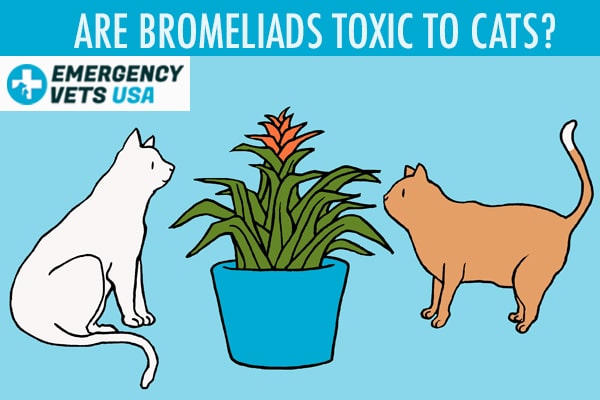Are Bromeliad Plants Toxic To Cats?
Plant lovers around the world are often searching for non-toxic plants for their home.
Cats are curious creatures that love to explore foliage, and no plant is safe in their path.
Cats will nibble on a houseplant at any given opportunity, making it essential to keep any toxic plants out of your home.
Thankfully, bromeliads are considered non-toxic, but there are still some risks to keep in mind.
In this article we will discuss the details surrounding bromeliad plants and our feline friends, and help you better understand why you should still keep this plant away from your cat when possible.
What Are Bromeliad Plants?

Bromeliad plants, or Bromeliaceae, are a family of plants that are native to tropical parts of the world.
The Bromeliaceae family consists of 75 genera and 3,590 species, each of which are beautiful in their own way.
Though most of these plants grow in tropical climates, they have made their way to plant lover’s homes around the world.
Whether you have a Bromeliad garden or a plant displayed in your home, most are considered easy to care for.
Are Bromeliads Toxic To Cats?
If you are looking for a non-toxic plant to display in your home, look no further than the members of the Bromeliad family.
Bromeliads are not poisonous to cats or dogs, making them a safe plant to have in your garden or home.
An occasional munch on these plants should not result in any health complications for your furry friends, so you can display these plants without any guilt.
Can Cats Eat Bromeliad Plants Safely?
Bromeliad plants may not be toxic to cats, but it does not mean you should allow your cat to eat them freely.
Consuming a large amount of plant material can still be challenging for a cat to digest, leading to an increased potential for GI upset.
Many cats will munch on plants to their heart’s content, so it’s up to us to make sure they are not making this a regular habit.
Symptoms Of GI Upset From Bromeliad Plants
If your cat is chewing on a Bromeliad plant regularly, they may develop signs of GI upset at some point.
Though the plant is considered non-toxic and should not cause any major complications, there is always a risk of an upset stomach.
Some of the most common signs of GI upset in cats include:
- Vomiting
- Drooling
- Diarrhea
- Decreased appetite
- Anorexia
- Abdominal pain
If you notice any of the above symptoms in your cat, we suggest reaching out to your veterinarian for guidance.
Be sure to mention that your cat has a habit of chewing on plants, as this can help your vet make a proper diagnosis.
When To See The Vet
Anytime your cat is experiencing signs of GI upset, we suggest at least giving your veterinarian a call.
They can determine whether or not your cat needs to be seen based on their symptoms, as well as offer you any guidance to follow at home.
GI upset can easily lead to dehydration in our feline friends, so we always suggest acting quickly once you notice symptoms.
Treating GI Upset From Bromeliad Plants
If your cat’s GI upset is a result of eating a large amount of your Bromeliad plants, their treatment should be straightforward and effective.
Your cat may simply need supportive care to combat any nausea or diarrhea, as well as a diet that is not too hard on their stomach as they recover.
Every situation will vary, but most cats will have a fast recovery!
Final Thoughts
Bromeliad plants are perfectly safe to keep in and around your home when you have a feline friend.
Just be sure to monitor your cat for any frequent plant snacking, as this can still cause some minor GI upset.

My name is Amber. I am a dedicated animal lover that turned my passion into my career. I am a Licensed Vet Tech with 12 years of experience in veterinary medicine, but I recently took my career online to help spread accurate information on animal care. With how vast the online world is, I have a strong desire to ensure that the reader always walks away with helpful pet advice. With the experience I’ve gained from my time in this field, I have been able to travel the world, offering my services to as many animal rescues as I can find. If I am not at my laptop, or back home visiting family, you can find me somewhere in the world, cuddling every furry friend that I can find! More About Us
